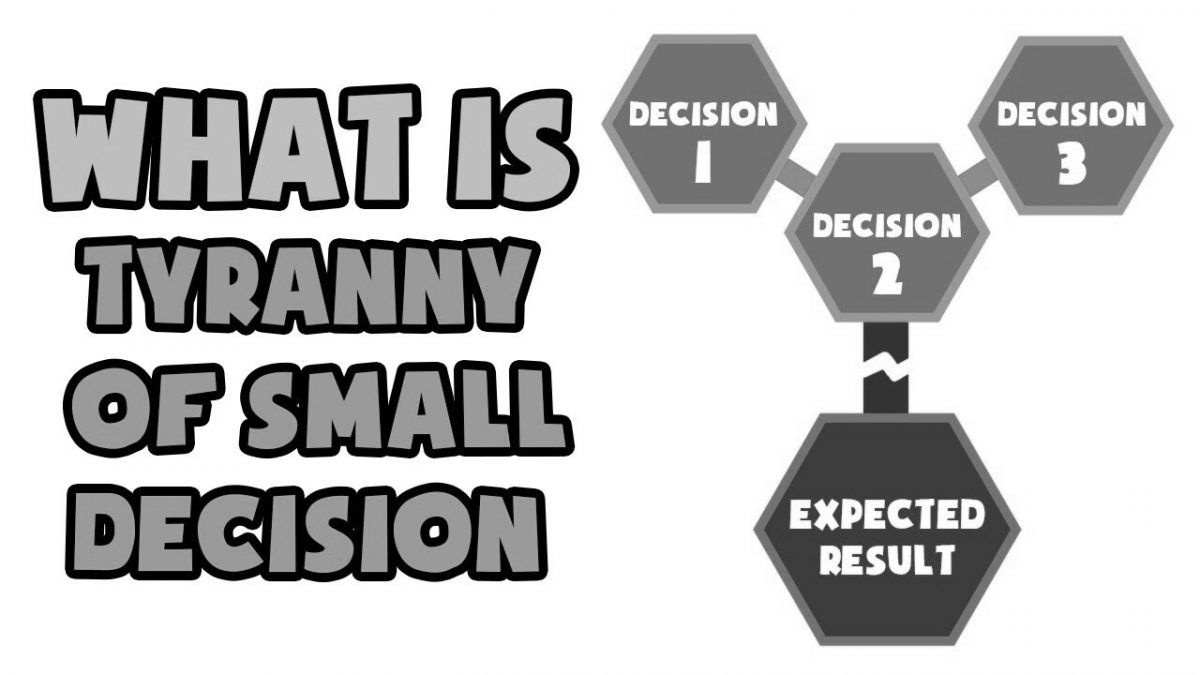Introduction
In the realm of decision-making, understanding the psychological biases that influence our choices is essential. One such bias is the Tyranny of Small Decisions, which refers to the cumulative impact of numerous minor decisions that, when viewed in isolation, may seem inconsequential but collectively lead to significant outcomes. Anchored in human psychology, this mental model highlights the importance of considering the long-term implications of seemingly small choices. The Tyranny of Small Decisions is prevalent in our day-to-day lives and has profound implications for decision-making processes. In this blog post, we will explore the concept of the Tyranny of Small Decisions, examine its occurrence in various contexts, analyze the biases that contribute to it, provide practical strategies to counteract its influence, and emphasize the value of awareness and active avoidance of this mental trap.
Understanding the Tyranny of Small Decisions
The Tyranny of Small Decisions refers to the cumulative effect of a series of seemingly insignificant choices that, when combined, can lead to significant consequences. Each individual decision may appear inconsequential, but over time, they can shape our lives, businesses, and even public policies. This mental model highlights the need to consider the long-term impact of seemingly small choices and avoid falling into the trap of making decisions without considering their cumulative effects.
The Role of the Tyranny of Small Decisions in Decision-Making
The Tyranny of Small Decisions can manifest itself in various contexts, influencing personal life decisions, business scenarios, and public policy-making. Let’s explore three distinct examples to illustrate the occurrence of the Tyranny of Small Decisions and the irrational choices it can lead to.
- Personal Life Decisions: Consider a person’s daily routine and lifestyle choices. Each day, they may make seemingly insignificant decisions such as hitting the snooze button, opting for unhealthy snacks, or procrastinating on important tasks. Individually, these choices may not have a significant impact. However, over time, they can contribute to chronic sleep deprivation, poor health, and decreased productivity. By neglecting the cumulative effect of small decisions, individuals may find themselves in unfavorable situations that could have been avoided with more mindful choices.
- Business Scenarios: In business, the Tyranny of Small Decisions can affect areas such as resource allocation, customer service, and organizational culture. For instance, a company may gradually cut costs by making minor reductions in customer service quality or employee benefits. While each decision may save a small amount of money, the cumulative effect can result in dissatisfied customers, demotivated employees, and long-term damage to the company’s reputation. Ignoring the cumulative impact of small decisions can undermine the overall success and sustainability of a business.
- Public Policy-Making: The Tyranny of Small Decisions can also influence public policy-making processes. Lawmakers may make incremental policy changes over time, responding to short-term demands or pressures. However, failing to consider the cumulative effects of these decisions can result in unintended consequences, such as increased inequality, environmental degradation, or social unrest. By focusing on the immediate context and neglecting the long-term implications, policymakers may unknowingly contribute to negative societal outcomes.
Biases Contributing to the Tyranny of Small Decisions
The Tyranny of Small Decisions is influenced by several cognitive biases and psychological factors. Some of the biases that contribute to this mental trap include:
- Present Bias: The present bias leads individuals to prioritize immediate gratification over long-term benefits. When faced with small decisions, the desire for instant rewards or convenience can overshadow considerations of future consequences. This bias can blind individuals to the cumulative impact of their choices.
- Anchoring Bias: The anchoring bias causes individuals to rely too heavily on the initial piece of information encountered when making decisions. In the context of the Tyranny of Small Decisions, individuals may anchor their choices to the immediate context without considering the long-term ramifications.
- Status Quo Bias: The status quo bias reflects our tendency to prefer maintaining the current state of affairs rather than making changes. When faced with small decisions, individuals may default to maintaining the status quo, overlooking the potential long-term benefits of alternative choices.
Psychological Underpinnings and Mitigation Strategies
The Tyranny of Small Decisions can be attributed to several psychological underpinnings, including our inherent cognitive biases, limited cognitive resources, and the influence of social norms. To mitigate the influence of the Tyranny of Small Decisions, consider the following strategies:
- Recognize Cumulative Effects: Develop an awareness of the potential long-term consequences of seemingly small decisions. Consider the compounding effects and evaluate choices based on their cumulative impact rather than their immediate outcomes.
- Set Clear Goals and Priorities: Define your long-term goals and priorities. Align your small decisions with these broader objectives to ensure they contribute to your desired outcomes. Regularly revisit and evaluate your choices to ensure they remain consistent with your overarching goals.
- Take a Big-Picture Perspective: Step back and view your decisions from a larger perspective. Consider the ripple effects and the potential compounding impact of your choices over time. This broader view can help you make more informed and strategic decisions.
Conclusion
The Tyranny of Small Decisions highlights the cumulative impact of seemingly inconsequential choices on our lives, businesses, and society. By understanding this mental model and its prevalence in various contexts, we can develop awareness of our susceptibility to its influence. Recognizing the biases that contribute to the Tyranny of Small Decisions and implementing practical strategies can empower us to make more objective choices. Ultimately, by actively avoiding this mental trap, we can navigate decision-making processes more effectively and align our choices with our long-term well-being and success.
